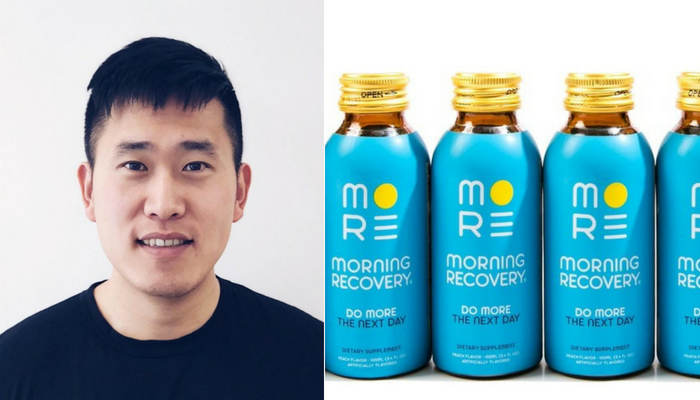Sisun Lee is no stranger to the tech industry. Lee started his career working as a product manager at several big-name companies, working with engineers to build products for Facebook, Uber, and Tesla.
But outside the office, Lee was working on his other passion — developing the perfect ‘hangover cure.’ It’s a novel idea — one inspired by a trip to South Korea in 2016, and the discovery of a herbal remedy (a compound called DHM) that was popular overseas, but not prominent in the States.
Lee partnered with researchers from the University of Southern California (USC) to develop what would become Morning Recovery. The drink received overwhelming response in beta, prompting Lee and his team to secure FDA compliance and expand their direct-to-consumer sales model into Amazon. Since the August 2017 launch under Lee’s parent company 82 Labs, the brand has sold 1.5 million bottles of Morning Recovery worldwide, and has raised $8 million in Series A funding at a $33 million valuation.
DMN sat down with Lee to discuss his first year building a brand, and what it’s like to dive into entrepreneurship after working in big tech.
DMN: What inspired you to become interested in the health and wellness industry?
Lee: I’ve always been really interested in just general wellness and fitness — it’s a hobby of mine, from the very general idea of staying fit, and being your healthiest, best self. But once I visited South Korea, which is my home country, (Editor’s Note: Lee left when he was nine, and raised in Canada) I realized that there were many solutions and existing innovations around a cure for this, an entire industry like energy drinks, but around hangovers. People were taking it very seriously, and it was already really mainstream. Having witnessed this that as a consumer, it was an amazing experience. I realized – why am I not doing this every day? How come this isn’t a thing that’s available in the States?
DMN: What you were doing before — it’s a completely different industry. Did you take any of the lessons you learned from the tech space with you as you grew as an entrepreneur?
Lee: My job has always been to build products, and working with the engineering team. Obviously, I had to understand the tech specs, but largely, my job was to figure out what consumers love, what they expected from us, and creating products that they would love to use. For me, figuring that out has always been the more interesting piece of it, regardless of what the underlying technology or specific product I was working on.
Even though I’m in a small company [now], in the field of wellness, largely what we’re trying to understand is the problem customers face, and what is the best way, and the most delightful way, to fix that. It’s very different industries with different circumstances, but I feel like what I’ve done, and what I do now, remain the same.
DMN: What were some of the biggest challenges you faced as you made the transition and got your company off the ground?
Lee: I think the biggest challenges are the unexpected ones, because you don’t know what you don’t know, and I’m sure there’s some of those that we haven’t yet faced. We work in a very heavily regulated field. In the startup world, especially in the software industry, you experiment very freely. You have an idea, especially if it’s an app or website, and you build it out in the market. You see what customers say about it, and you get the feedback. But that’s not something that you can do as a company, if you’re working with dietary supplements. There’s liability issues — anything that people consume, even if it’s not for sale and just for samples for laboratory learnings — there are regulations that you have to follow.
The second thing, and I think this applies to any startup, is there’s no buffer room in how you plan for product development. You always underestimate how difficult is certain things are, make promises, and you think in that sort of very ideal abstract. As production went on, there were glitches that we found that we didn’t anticipate before.
DMN: How did you approach your marketing strategy to win over customers?
Lee: Most people hear about us either directly through word of mouth or through our ads, and then come into our website. A lot of our ad campaigns are around educating customers. This is what happens to the body, this is the science behind it, and this how we can help you.
Even though it is a foreign concept, ultimately from all our experiments, and trying different messaging, we learned that customers just want to know if it works and what it tastes like. So a lot of that is beyond science. It’s really about getting as many real testimonials as possible, a and putting credentials in there. It’s really [came down to] how to simplify the messaging so that people, when they see it, they understand that it works, it tastes good, and this is where I can buy it.
DMN: How are you looking to build on Morning Recovery and 82 Labs as you continue to grow as a brand?
Lee: That’s an interesting question, because that’s transition that we’re taking currently. We’ve always thought about having an umbrella company that can do a bit more beyond Morning Recovery. For us as a small company where we don’t have brand equity, we thought that we had to go out there and establish our brand by creating something people could experience, and they understood right away, to build trust. That’s always been the “step one” for us. In the next couple of months, we’re still growing Morning Recovery, figuring out distribution channels having the right message is going to be important for us. But we’re also going to start to roll out new products.







